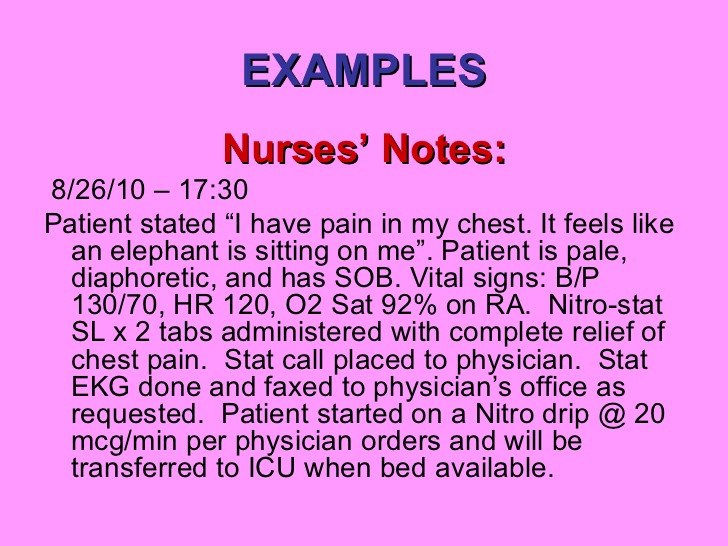Nursing notes play a vital role in the healthcare system, serving as a means of communication among healthcare professionals. These notes are essential for ensuring continuity of care, tracking patient progress, and providing a detailed account of the patient’s condition and treatment. Good nursing notes not only reflect the quality of care provided but also serve as legal documents that can protect nurses and healthcare facilities in the event of disputes. Therefore, understanding how to write effective nursing notes is crucial for every nurse.
In this article, we will explore examples of good nursing notes and the characteristics that make them effective. From documenting patient assessments to detailing interventions and outcomes, well-crafted nursing notes can enhance patient care and improve communication within a healthcare team. By examining various scenarios and note-taking styles, we aim to provide you with the tools needed to excel in nursing documentation.
Whether you're a seasoned nurse or a nursing student, understanding examples of good nursing notes will help you navigate the complexities of patient documentation. We will delve into the significance of being clear, concise, and accurate in your notes, and how these practices can have a significant impact on patient outcomes. So, let’s dive into the world of nursing notes and discover what makes them exemplary.
What Are the Essential Components of Good Nursing Notes?
Good nursing notes should always include the following essential components:
- Patient identification details
- Date and time of the entry
- Subjective and objective assessments
- Interventions performed
- Patient response to interventions
- Future care plans and follow-up recommendations
What Makes a Nursing Note Effective?
To craft effective nursing notes, consider the following elements:
- Clarity: Use straightforward language that is easy to understand.
- Conciseness: Avoid unnecessary jargon; get straight to the point.
- Accuracy: Record information precisely as observed or reported.
- Timeliness: Document notes as soon as possible after patient interaction.
Can You Provide Examples of Good Nursing Notes?
Here are some examples of good nursing notes for various scenarios:
Example 1: Post-operative Care
“On 10/01/2023 at 14:30, patient was observed in the recovery room post-appendectomy. Vital signs stable: BP 120/80, HR 78, RR 16, Temp 98.6°F. Patient reports pain level of 4/10 at the incision site. Administered prescribed analgesic (Morphine 2mg IV) at 14:45. Patient tolerated medication well, pain level decreased to 2/10 within 30 minutes. Continue to monitor vitals every 15 minutes.”
Example 2: Patient Assessment
“On 10/01/2023 at 09:00, patient admitted with a diagnosis of pneumonia. Patient exhibits productive cough with green sputum. Lung auscultation reveals crackles in the right lower lobe. Oxygen saturation at 92% on room air. Administered nebulizer treatment as per protocol. Patient demonstrated improved breathing pattern post-treatment. Will reassess in 1 hour.”
How Can You Improve Your Nursing Note-Taking Skills?
Improving your nursing note-taking skills can be achieved through practice and the following strategies:
- Participate in workshops focused on documentation.
- Review and analyze examples of good nursing notes regularly.
- Seek feedback from experienced colleagues on your documentation style.
- Stay updated on legal and ethical standards regarding nursing documentation.
What Role Does Technology Play in Nursing Documentation?
Technology has revolutionized nursing documentation through the implementation of Electronic Health Records (EHRs). EHRs offer several advantages:
- Improved accuracy and accessibility of patient information.
- Streamlined communication among healthcare providers.
- Reduction in paperwork and manual errors.
Are There Common Mistakes to Avoid in Nursing Notes?
Yes, there are several common mistakes that nurses should avoid when writing notes:
- Using vague or ambiguous language.
- Failing to document important assessments or interventions.
- Writing notes after a significant delay.
- Neglecting to sign and date notes appropriately.
What Are the Legal Implications of Nursing Documentation?
Nursing notes can serve as legal documents in cases of malpractice or disputes. Therefore, it is essential to:
- Document honestly and accurately.
- Maintain professionalism in language and tone.
- Follow the facility’s policies regarding documentation.
Conclusion: Why Are Good Nursing Notes Crucial?
Good nursing notes are crucial not only for patient safety and care but also for legal protection. By documenting effectively, nurses can ensure that all relevant information is communicated clearly to the healthcare team, ultimately leading to better patient outcomes. Remember, examples of good nursing notes serve as a guide for all nursing professionals, regardless of their level of experience. By honing your note-taking skills, you contribute to a culture of excellence in nursing practice.
You Might Also Like
Exploring The Delicious Fusion Of Chinese Food PizzaA Comprehensive Guide To Acrylic Medium For Fabric Painting
Choosing Between Single Flush And Dual Flush Toilets: What You Need To Know
Mastering The Art Of Pull-Ups: A Beginner's Guide
Embrace The Chill: Exciting Winter Activities Indoors
Article Recommendations
- Conrad Dobler Net Worth Career Achievements And Financial Insights
- Ultimate Guide To T50 Eye Color Facts Myths And Science
- Johnny Gills Wife Pictures Photos


